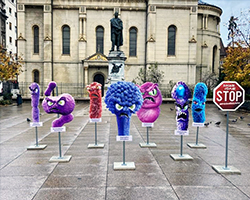Don’t let the COVID-19 crisis become an AMR catastrophe – countries put their weight behind World Antimicrobial Awareness Week 2020

WHO/Sven Pal
In the midst of the COVID-19 pandemic and all the pressures faced by public health providers, partners in countries across the WHO European Region nonetheless showed great commitment to marking World Antimicrobial Awareness Week (WAAW) 2020. Partners and other organizations in Member States conducted a wide range of activities to raise awareness about antimicrobial resistance (AMR), operating within local restrictions and shifting events online to keep participants safe.
Dr Nino Berdzuli, Director of WHO/Europe’s Division of Country Health Programmes, expressed the satisfaction felt by all involved at the high level of activity in countries, despite the difficulties caused by the pandemic. “It is most gratifying to see so many Member States maintaining and even increasing their activity for WAAW,” she commented. “I see enthusiasm and innovation coming to the fore in a most challenging year. The pandemic has put into sharp focus the fact that we all need to redouble our efforts in controlling antibiotic resistance.”
Reaching audiences safely with online activity
WHO/Europe organized a webinar, working with tripartite partners from the Food and Agriculture Organization of the United Nations (FAO) Regional Office for Europe and Central Asia, and the World Organisation for Animal Health (OIE) Sub-Regional Representation for Central Asia. The online event attracted some 255 high-level representatives from both human and veterinary public health. The tripartite partners’ sister group in Turkey – Tripartite Turkey Working Group – also held an online symposium entitled “Action and partnership on antimicrobial resistance to ensure a coordinated One Health approach in Europe and central Asia”, involving 300 participants from relevant professions, such as physicians, nurses, pharmacists and veterinarians. In Bulgaria, information videos were prepared for the general public and also for health-care workers. Materials were disseminated via a patient portal.
In Lithuania, 200 people participated in an online conference on “Antimicrobial resistance in the context of COVID-19”, organized by the Ministry of Health and the Institute of Hygiene of Lithuania. Participants included directors of hospitals and primary care institutions, doctors and infection control specialists. Similar events were held in other countries including Slovenia, Croatia, and Greece, where an event reached 70 doctors working across the Greek islands. Webinars in Ukraine reached 500 people in key jobs.
Getting the point across with social media and giant bacteria
With support from WHO/Europe, many countries produced local language versions of WAAW materials and initiated widespread media outreach and social media campaigning. In Lithuania, WAAW received national press coverage and films were shown on public transport. In the Croatian capital Zagreb, people handed out information dressed in giant bacteria costumes.
The WHO Country Office in Ukraine conducted a social media campaign to raise awareness and highlight best practice. In Romania, more than 50 articles appeared in traditional media and a social media campaign was conducted in Romanian. Georgia enjoyed extensive television coverage of WAAW and an raising awareness team toured primary health centres giving presentations. In Bulgaria, 3 different films were produced and disseminated in tandem with a social media campaign.
Greece launched a social media campaign, in cooperation with youth partners, reaching over 30 000 users. They also launched a digital awareness campaign, in partnership with selected news websites.
Partnerships get results
The WHO Country Office in Ukraine partnered with an nongovernmental organization, Ukrainian Medical High School, to record and publish 5 video lectures on rational use of antibiotics for medical professionals and students, funded by WHO/Europe. The lectures covered various topics, from the basics of antimicrobial stewardship to using antibiotics rationally during upper respiratory tract infections. The lectures were watched by more than 1500 people during the awareness week alone.
WAAW in Romania also featured a strong partnership with both the Romanian Society for Microbiology and one of the main news platforms in the country – DC News. A lively online debate, moderated by a prominent health journalist, was held involving the WHO Representative in Romania, Dr Miljana Grbic, as well as professionals active in the field. The debate was broadcast live and also featured an audience survey that gathered responses from more than 45 000 people –showing that 15% of respondents still believe that antibiotics treat viruses.
The WHO Country Office in Greece participated in a joint press conference on AMR, with the Greek Ministry of Health, the National Public Health Organization, the Center for Clinical Epidemiology and Outcomes Research, and the newly formed Agency for Patient Safety and Quality Improvement. Youth outreach was also conducted to engage with 700 Greek medical students.
In Kazakhstan, the National Centre for the Rational Use of Medicines conducted an information campaign among the medical and pharmaceutical community, specialists in the field of agriculture, and the general public, resulting in television and radio coverage, as well as live events. In Tajikistan, a well-attended event was held for health-care workers in the paediatric infectious diseases hospital. The WHO Country Office in Turkmenistan assisted the Ministry of Health in delivering important messages to the public by supporting the translation and printing of campaign materials. Five types of posters in Russian and Turkmen were printed and distributed in regional health facilities.
The dates for WAAW previously varied, but are now fixed; in 2021 and future years, events will be held on 18–24 November.



